Exploring the Relationship Between Self-Efficacy and Mental Well-Being
VerifiedAdded on 2020/04/15
|22
|5768
|124
AI Summary
The research paper aims to dissect the relationship between self-efficacy and mental well-being. By examining scholarly articles such as those by Soysa and colleagues (2015), students will evaluate how self-efficacy impacts emotional health, stress levels, depression, anxiety, and overall psychological stability. The assignment encourages a critical analysis of methodologies and findings to determine the broader implications for mental health practices.
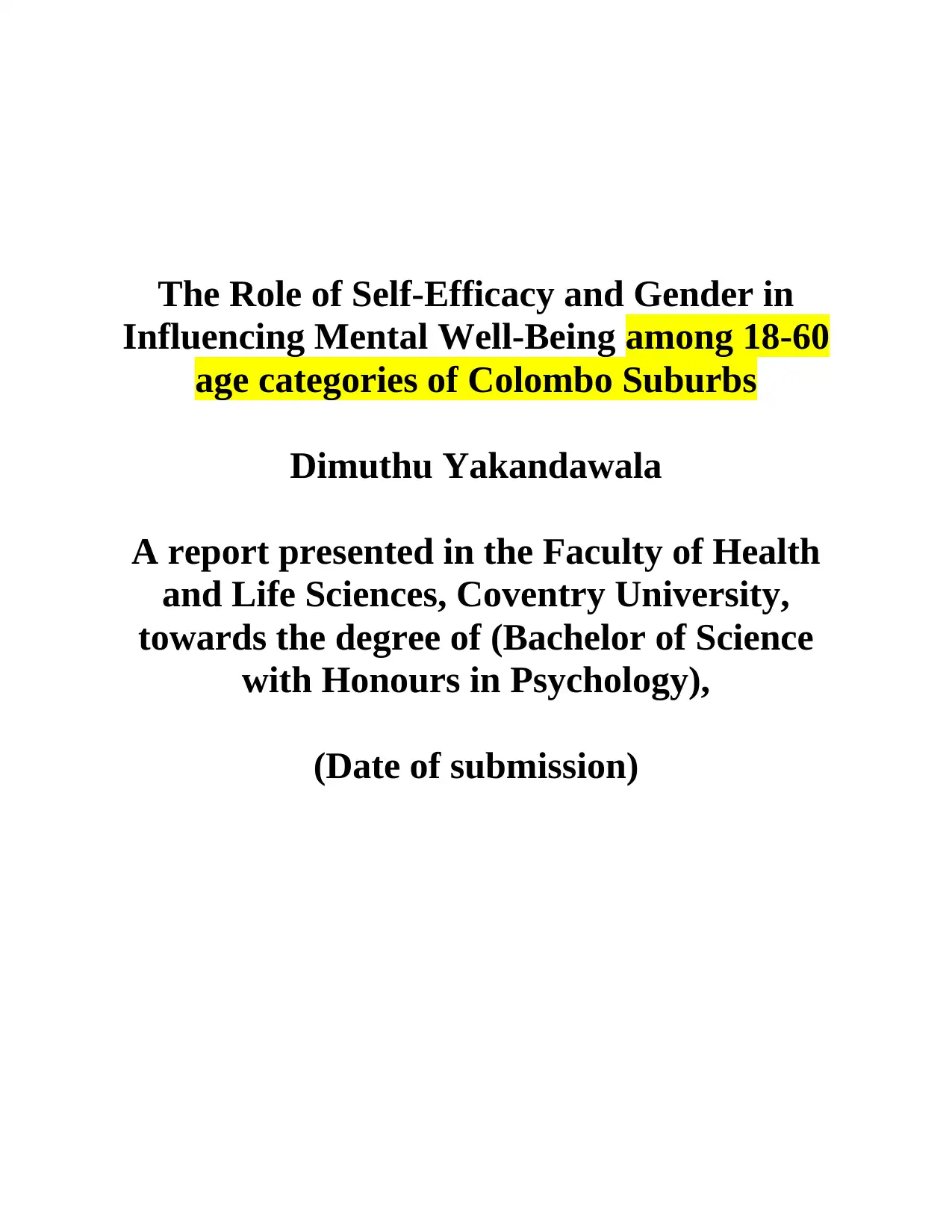
The Role of Self-Efficacy and Gender in
Influencing Mental Well-Being among 18-60
age categories of Colombo Suburbs
Dimuthu Yakandawala
A report presented in the Faculty of Health
and Life Sciences, Coventry University,
towards the degree of (Bachelor of Science
with Honours in Psychology),
(Date of submission)
Influencing Mental Well-Being among 18-60
age categories of Colombo Suburbs
Dimuthu Yakandawala
A report presented in the Faculty of Health
and Life Sciences, Coventry University,
towards the degree of (Bachelor of Science
with Honours in Psychology),
(Date of submission)
Paraphrase This Document
Need a fresh take? Get an instant paraphrase of this document with our AI Paraphraser
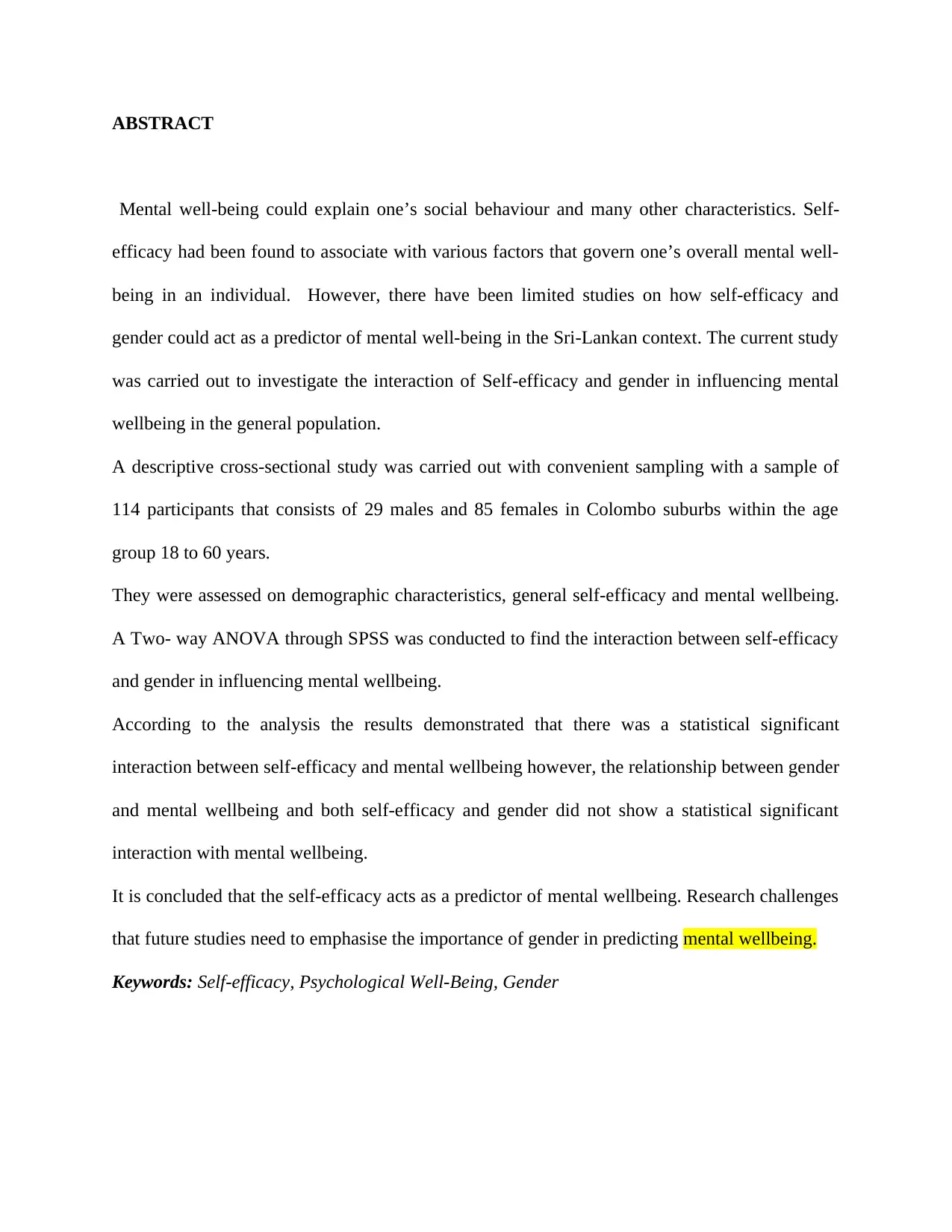
ABSTRACT
Mental well-being could explain one’s social behaviour and many other characteristics. Self-
efficacy had been found to associate with various factors that govern one’s overall mental well-
being in an individual. However, there have been limited studies on how self-efficacy and
gender could act as a predictor of mental well-being in the Sri-Lankan context. The current study
was carried out to investigate the interaction of Self-efficacy and gender in influencing mental
wellbeing in the general population.
A descriptive cross-sectional study was carried out with convenient sampling with a sample of
114 participants that consists of 29 males and 85 females in Colombo suburbs within the age
group 18 to 60 years.
They were assessed on demographic characteristics, general self-efficacy and mental wellbeing.
A Two- way ANOVA through SPSS was conducted to find the interaction between self-efficacy
and gender in influencing mental wellbeing.
According to the analysis the results demonstrated that there was a statistical significant
interaction between self-efficacy and mental wellbeing however, the relationship between gender
and mental wellbeing and both self-efficacy and gender did not show a statistical significant
interaction with mental wellbeing.
It is concluded that the self-efficacy acts as a predictor of mental wellbeing. Research challenges
that future studies need to emphasise the importance of gender in predicting mental wellbeing.
Keywords: Self-efficacy, Psychological Well-Being, Gender
Mental well-being could explain one’s social behaviour and many other characteristics. Self-
efficacy had been found to associate with various factors that govern one’s overall mental well-
being in an individual. However, there have been limited studies on how self-efficacy and
gender could act as a predictor of mental well-being in the Sri-Lankan context. The current study
was carried out to investigate the interaction of Self-efficacy and gender in influencing mental
wellbeing in the general population.
A descriptive cross-sectional study was carried out with convenient sampling with a sample of
114 participants that consists of 29 males and 85 females in Colombo suburbs within the age
group 18 to 60 years.
They were assessed on demographic characteristics, general self-efficacy and mental wellbeing.
A Two- way ANOVA through SPSS was conducted to find the interaction between self-efficacy
and gender in influencing mental wellbeing.
According to the analysis the results demonstrated that there was a statistical significant
interaction between self-efficacy and mental wellbeing however, the relationship between gender
and mental wellbeing and both self-efficacy and gender did not show a statistical significant
interaction with mental wellbeing.
It is concluded that the self-efficacy acts as a predictor of mental wellbeing. Research challenges
that future studies need to emphasise the importance of gender in predicting mental wellbeing.
Keywords: Self-efficacy, Psychological Well-Being, Gender
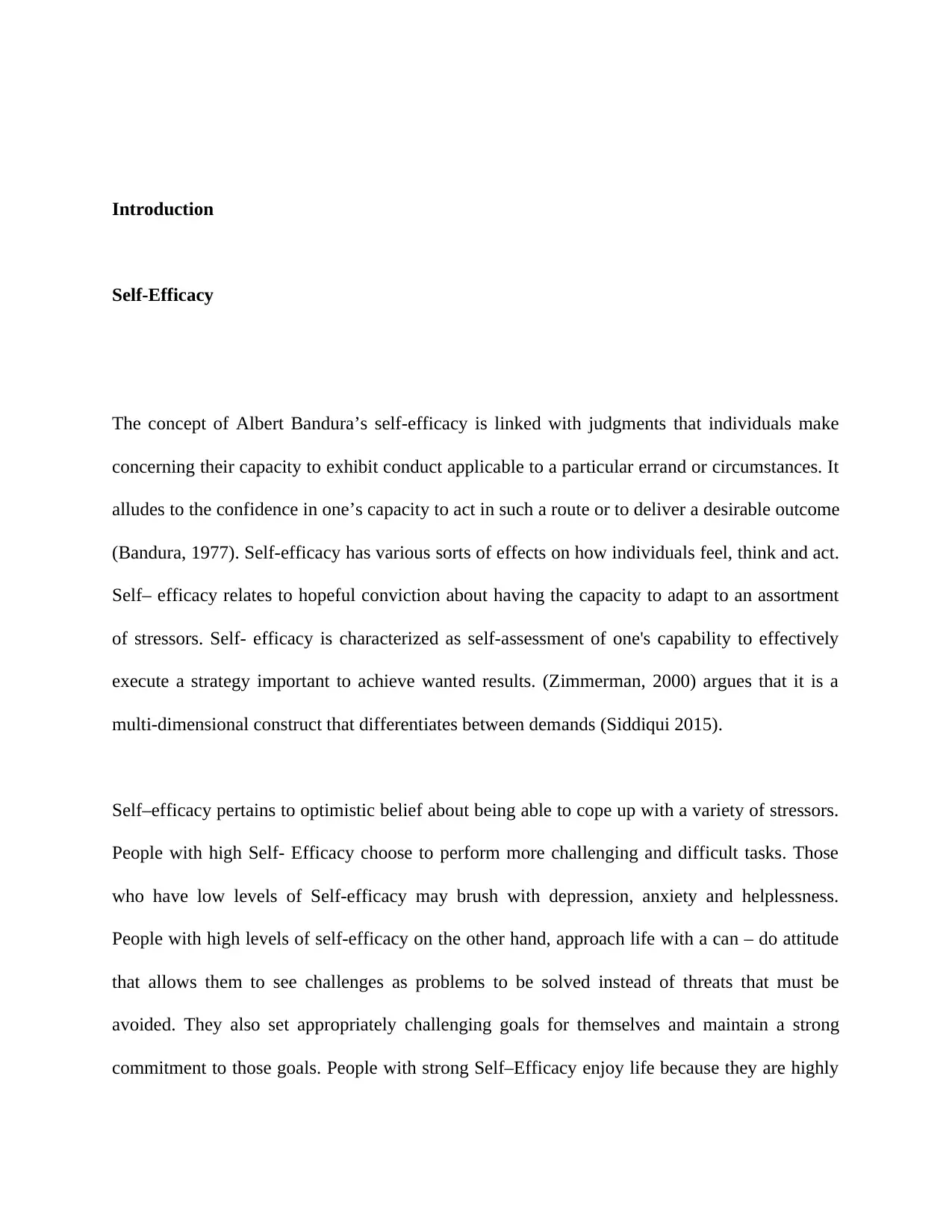
Introduction
Self-Efficacy
The concept of Albert Bandura’s self-efficacy is linked with judgments that individuals make
concerning their capacity to exhibit conduct applicable to a particular errand or circumstances. It
alludes to the confidence in one’s capacity to act in such a route or to deliver a desirable outcome
(Bandura, 1977). Self-efficacy has various sorts of effects on how individuals feel, think and act.
Self– efficacy relates to hopeful conviction about having the capacity to adapt to an assortment
of stressors. Self- efficacy is characterized as self-assessment of one's capability to effectively
execute a strategy important to achieve wanted results. (Zimmerman, 2000) argues that it is a
multi-dimensional construct that differentiates between demands (Siddiqui 2015).
Self–efficacy pertains to optimistic belief about being able to cope up with a variety of stressors.
People with high Self- Efficacy choose to perform more challenging and difficult tasks. Those
who have low levels of Self-efficacy may brush with depression, anxiety and helplessness.
People with high levels of self-efficacy on the other hand, approach life with a can – do attitude
that allows them to see challenges as problems to be solved instead of threats that must be
avoided. They also set appropriately challenging goals for themselves and maintain a strong
commitment to those goals. People with strong Self–Efficacy enjoy life because they are highly
Self-Efficacy
The concept of Albert Bandura’s self-efficacy is linked with judgments that individuals make
concerning their capacity to exhibit conduct applicable to a particular errand or circumstances. It
alludes to the confidence in one’s capacity to act in such a route or to deliver a desirable outcome
(Bandura, 1977). Self-efficacy has various sorts of effects on how individuals feel, think and act.
Self– efficacy relates to hopeful conviction about having the capacity to adapt to an assortment
of stressors. Self- efficacy is characterized as self-assessment of one's capability to effectively
execute a strategy important to achieve wanted results. (Zimmerman, 2000) argues that it is a
multi-dimensional construct that differentiates between demands (Siddiqui 2015).
Self–efficacy pertains to optimistic belief about being able to cope up with a variety of stressors.
People with high Self- Efficacy choose to perform more challenging and difficult tasks. Those
who have low levels of Self-efficacy may brush with depression, anxiety and helplessness.
People with high levels of self-efficacy on the other hand, approach life with a can – do attitude
that allows them to see challenges as problems to be solved instead of threats that must be
avoided. They also set appropriately challenging goals for themselves and maintain a strong
commitment to those goals. People with strong Self–Efficacy enjoy life because they are highly
⊘ This is a preview!⊘
Do you want full access?
Subscribe today to unlock all pages.

Trusted by 1+ million students worldwide
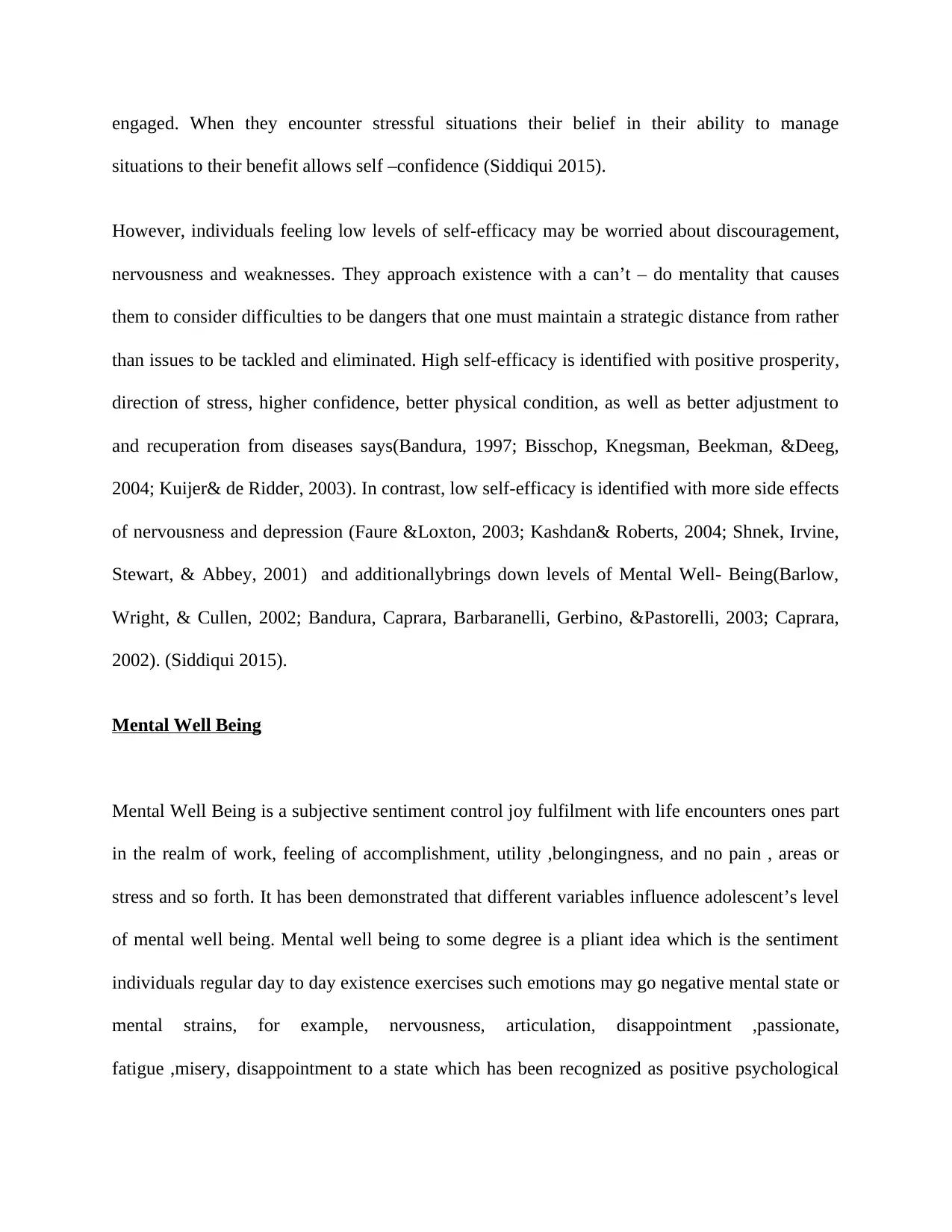
engaged. When they encounter stressful situations their belief in their ability to manage
situations to their benefit allows self –confidence (Siddiqui 2015).
However, individuals feeling low levels of self-efficacy may be worried about discouragement,
nervousness and weaknesses. They approach existence with a can’t – do mentality that causes
them to consider difficulties to be dangers that one must maintain a strategic distance from rather
than issues to be tackled and eliminated. High self-efficacy is identified with positive prosperity,
direction of stress, higher confidence, better physical condition, as well as better adjustment to
and recuperation from diseases says(Bandura, 1997; Bisschop, Knegsman, Beekman, &Deeg,
2004; Kuijer& de Ridder, 2003). In contrast, low self-efficacy is identified with more side effects
of nervousness and depression (Faure &Loxton, 2003; Kashdan& Roberts, 2004; Shnek, Irvine,
Stewart, & Abbey, 2001) and additionallybrings down levels of Mental Well- Being(Barlow,
Wright, & Cullen, 2002; Bandura, Caprara, Barbaranelli, Gerbino, &Pastorelli, 2003; Caprara,
2002). (Siddiqui 2015).
Mental Well Being
Mental Well Being is a subjective sentiment control joy fulfilment with life encounters ones part
in the realm of work, feeling of accomplishment, utility ,belongingness, and no pain , areas or
stress and so forth. It has been demonstrated that different variables influence adolescent’s level
of mental well being. Mental well being to some degree is a pliant idea which is the sentiment
individuals regular day to day existence exercises such emotions may go negative mental state or
mental strains, for example, nervousness, articulation, disappointment ,passionate,
fatigue ,misery, disappointment to a state which has been recognized as positive psychological
situations to their benefit allows self –confidence (Siddiqui 2015).
However, individuals feeling low levels of self-efficacy may be worried about discouragement,
nervousness and weaknesses. They approach existence with a can’t – do mentality that causes
them to consider difficulties to be dangers that one must maintain a strategic distance from rather
than issues to be tackled and eliminated. High self-efficacy is identified with positive prosperity,
direction of stress, higher confidence, better physical condition, as well as better adjustment to
and recuperation from diseases says(Bandura, 1997; Bisschop, Knegsman, Beekman, &Deeg,
2004; Kuijer& de Ridder, 2003). In contrast, low self-efficacy is identified with more side effects
of nervousness and depression (Faure &Loxton, 2003; Kashdan& Roberts, 2004; Shnek, Irvine,
Stewart, & Abbey, 2001) and additionallybrings down levels of Mental Well- Being(Barlow,
Wright, & Cullen, 2002; Bandura, Caprara, Barbaranelli, Gerbino, &Pastorelli, 2003; Caprara,
2002). (Siddiqui 2015).
Mental Well Being
Mental Well Being is a subjective sentiment control joy fulfilment with life encounters ones part
in the realm of work, feeling of accomplishment, utility ,belongingness, and no pain , areas or
stress and so forth. It has been demonstrated that different variables influence adolescent’s level
of mental well being. Mental well being to some degree is a pliant idea which is the sentiment
individuals regular day to day existence exercises such emotions may go negative mental state or
mental strains, for example, nervousness, articulation, disappointment ,passionate,
fatigue ,misery, disappointment to a state which has been recognized as positive psychological
Paraphrase This Document
Need a fresh take? Get an instant paraphrase of this document with our AI Paraphraser
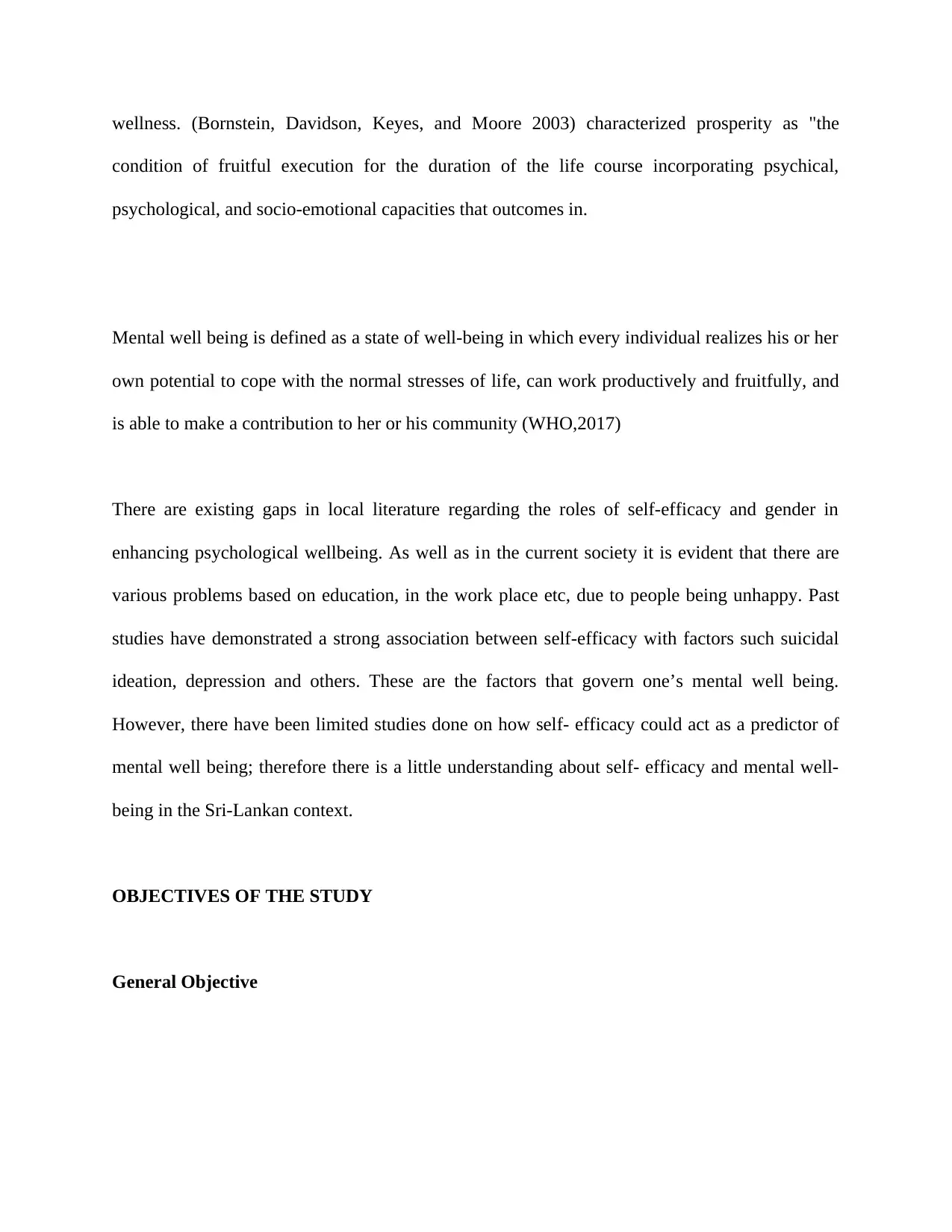
wellness. (Bornstein, Davidson, Keyes, and Moore 2003) characterized prosperity as "the
condition of fruitful execution for the duration of the life course incorporating psychical,
psychological, and socio-emotional capacities that outcomes in.
Mental well being is defined as a state of well-being in which every individual realizes his or her
own potential to cope with the normal stresses of life, can work productively and fruitfully, and
is able to make a contribution to her or his community (WHO,2017)
There are existing gaps in local literature regarding the roles of self-efficacy and gender in
enhancing psychological wellbeing. As well as in the current society it is evident that there are
various problems based on education, in the work place etc, due to people being unhappy. Past
studies have demonstrated a strong association between self-efficacy with factors such suicidal
ideation, depression and others. These are the factors that govern one’s mental well being.
However, there have been limited studies done on how self- efficacy could act as a predictor of
mental well being; therefore there is a little understanding about self- efficacy and mental well-
being in the Sri-Lankan context.
OBJECTIVES OF THE STUDY
General Objective
condition of fruitful execution for the duration of the life course incorporating psychical,
psychological, and socio-emotional capacities that outcomes in.
Mental well being is defined as a state of well-being in which every individual realizes his or her
own potential to cope with the normal stresses of life, can work productively and fruitfully, and
is able to make a contribution to her or his community (WHO,2017)
There are existing gaps in local literature regarding the roles of self-efficacy and gender in
enhancing psychological wellbeing. As well as in the current society it is evident that there are
various problems based on education, in the work place etc, due to people being unhappy. Past
studies have demonstrated a strong association between self-efficacy with factors such suicidal
ideation, depression and others. These are the factors that govern one’s mental well being.
However, there have been limited studies done on how self- efficacy could act as a predictor of
mental well being; therefore there is a little understanding about self- efficacy and mental well-
being in the Sri-Lankan context.
OBJECTIVES OF THE STUDY
General Objective
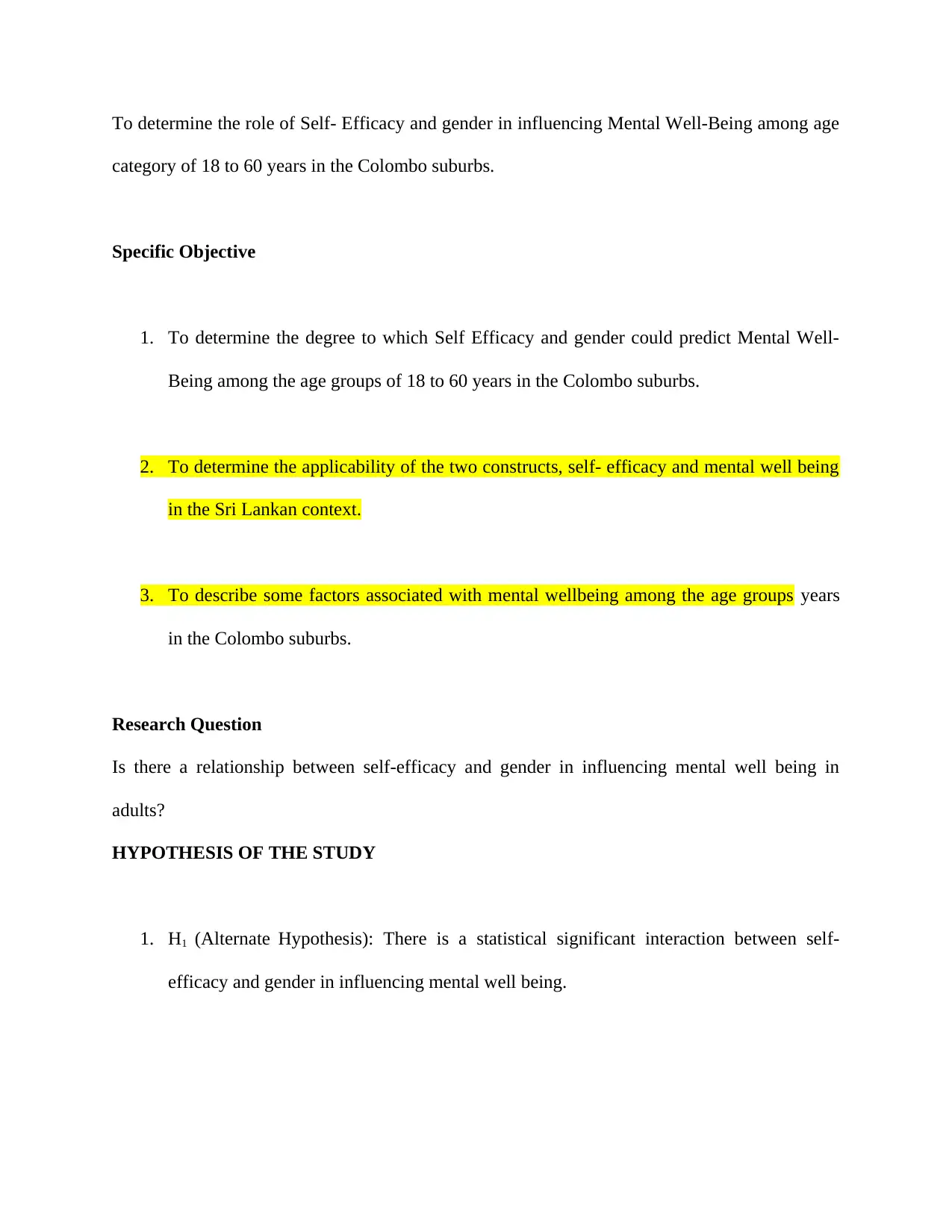
To determine the role of Self- Efficacy and gender in influencing Mental Well-Being among age
category of 18 to 60 years in the Colombo suburbs.
Specific Objective
1. To determine the degree to which Self Efficacy and gender could predict Mental Well-
Being among the age groups of 18 to 60 years in the Colombo suburbs.
2. To determine the applicability of the two constructs, self- efficacy and mental well being
in the Sri Lankan context.
3. To describe some factors associated with mental wellbeing among the age groups years
in the Colombo suburbs.
Research Question
Is there a relationship between self-efficacy and gender in influencing mental well being in
adults?
HYPOTHESIS OF THE STUDY
1. H1 (Alternate Hypothesis): There is a statistical significant interaction between self-
efficacy and gender in influencing mental well being.
category of 18 to 60 years in the Colombo suburbs.
Specific Objective
1. To determine the degree to which Self Efficacy and gender could predict Mental Well-
Being among the age groups of 18 to 60 years in the Colombo suburbs.
2. To determine the applicability of the two constructs, self- efficacy and mental well being
in the Sri Lankan context.
3. To describe some factors associated with mental wellbeing among the age groups years
in the Colombo suburbs.
Research Question
Is there a relationship between self-efficacy and gender in influencing mental well being in
adults?
HYPOTHESIS OF THE STUDY
1. H1 (Alternate Hypothesis): There is a statistical significant interaction between self-
efficacy and gender in influencing mental well being.
⊘ This is a preview!⊘
Do you want full access?
Subscribe today to unlock all pages.

Trusted by 1+ million students worldwide
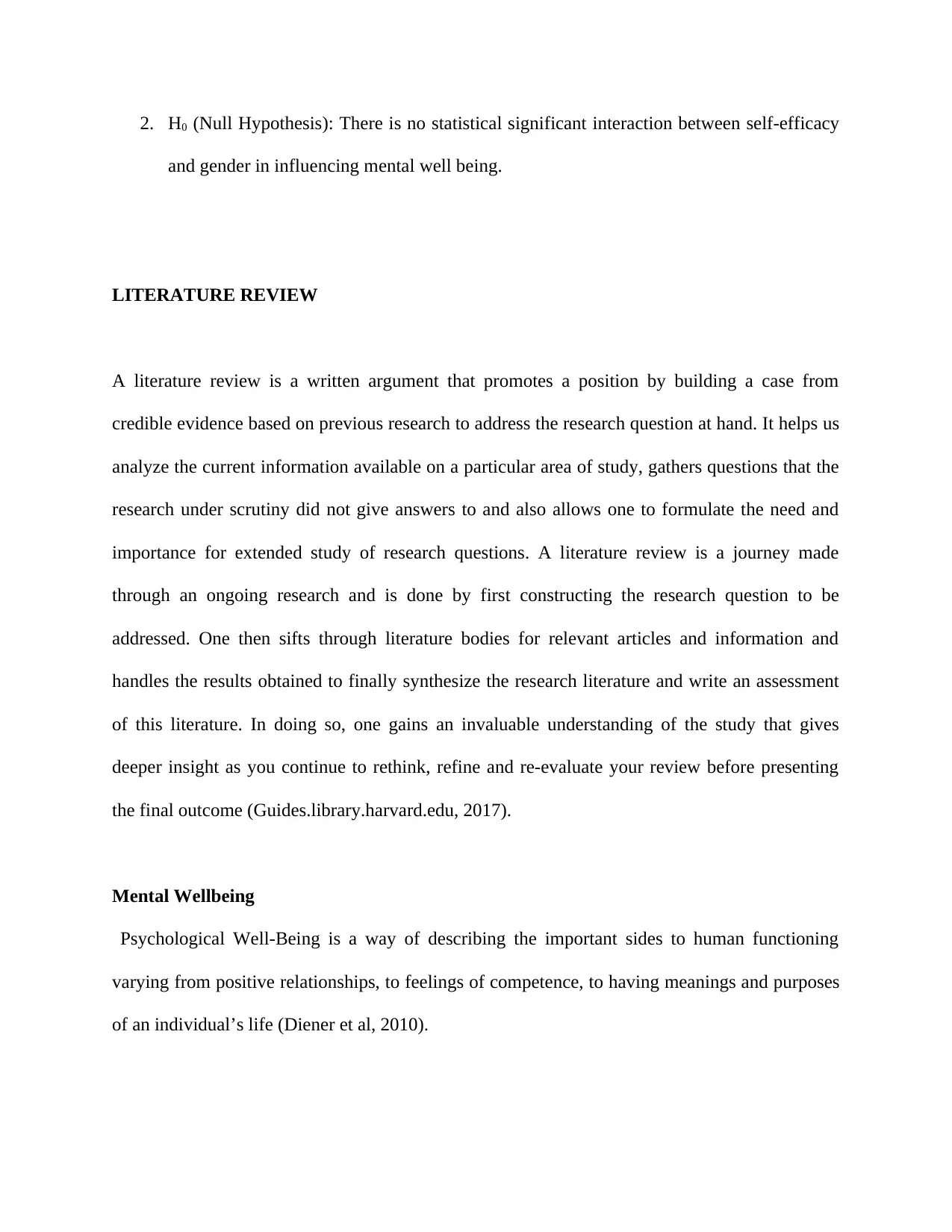
2. H0 (Null Hypothesis): There is no statistical significant interaction between self-efficacy
and gender in influencing mental well being.
LITERATURE REVIEW
A literature review is a written argument that promotes a position by building a case from
credible evidence based on previous research to address the research question at hand. It helps us
analyze the current information available on a particular area of study, gathers questions that the
research under scrutiny did not give answers to and also allows one to formulate the need and
importance for extended study of research questions. A literature review is a journey made
through an ongoing research and is done by first constructing the research question to be
addressed. One then sifts through literature bodies for relevant articles and information and
handles the results obtained to finally synthesize the research literature and write an assessment
of this literature. In doing so, one gains an invaluable understanding of the study that gives
deeper insight as you continue to rethink, refine and re-evaluate your review before presenting
the final outcome (Guides.library.harvard.edu, 2017).
Mental Wellbeing
Psychological Well-Being is a way of describing the important sides to human functioning
varying from positive relationships, to feelings of competence, to having meanings and purposes
of an individual’s life (Diener et al, 2010).
and gender in influencing mental well being.
LITERATURE REVIEW
A literature review is a written argument that promotes a position by building a case from
credible evidence based on previous research to address the research question at hand. It helps us
analyze the current information available on a particular area of study, gathers questions that the
research under scrutiny did not give answers to and also allows one to formulate the need and
importance for extended study of research questions. A literature review is a journey made
through an ongoing research and is done by first constructing the research question to be
addressed. One then sifts through literature bodies for relevant articles and information and
handles the results obtained to finally synthesize the research literature and write an assessment
of this literature. In doing so, one gains an invaluable understanding of the study that gives
deeper insight as you continue to rethink, refine and re-evaluate your review before presenting
the final outcome (Guides.library.harvard.edu, 2017).
Mental Wellbeing
Psychological Well-Being is a way of describing the important sides to human functioning
varying from positive relationships, to feelings of competence, to having meanings and purposes
of an individual’s life (Diener et al, 2010).
Paraphrase This Document
Need a fresh take? Get an instant paraphrase of this document with our AI Paraphraser
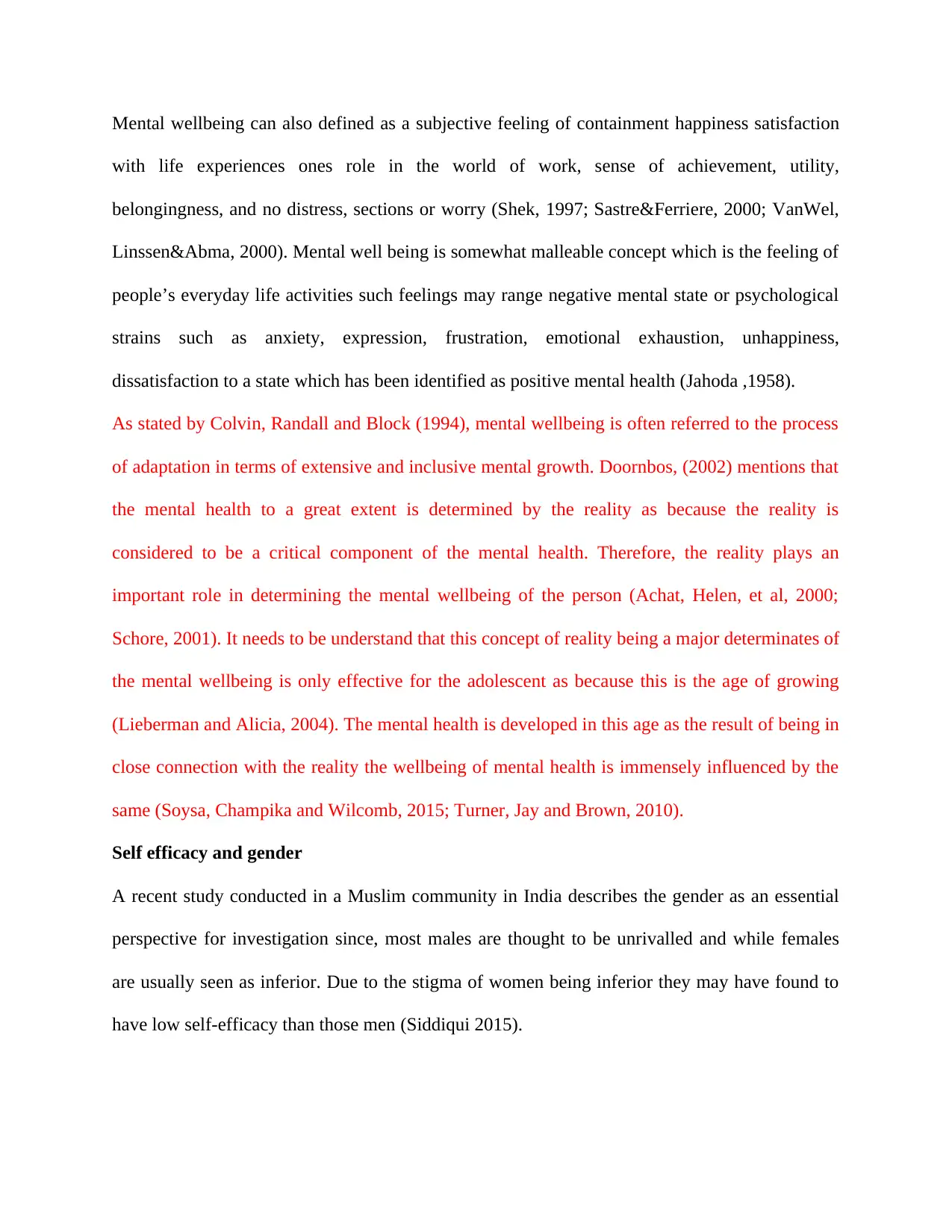
Mental wellbeing can also defined as a subjective feeling of containment happiness satisfaction
with life experiences ones role in the world of work, sense of achievement, utility,
belongingness, and no distress, sections or worry (Shek, 1997; Sastre&Ferriere, 2000; VanWel,
Linssen&Abma, 2000). Mental well being is somewhat malleable concept which is the feeling of
people’s everyday life activities such feelings may range negative mental state or psychological
strains such as anxiety, expression, frustration, emotional exhaustion, unhappiness,
dissatisfaction to a state which has been identified as positive mental health (Jahoda ,1958).
As stated by Colvin, Randall and Block (1994), mental wellbeing is often referred to the process
of adaptation in terms of extensive and inclusive mental growth. Doornbos, (2002) mentions that
the mental health to a great extent is determined by the reality as because the reality is
considered to be a critical component of the mental health. Therefore, the reality plays an
important role in determining the mental wellbeing of the person (Achat, Helen, et al, 2000;
Schore, 2001). It needs to be understand that this concept of reality being a major determinates of
the mental wellbeing is only effective for the adolescent as because this is the age of growing
(Lieberman and Alicia, 2004). The mental health is developed in this age as the result of being in
close connection with the reality the wellbeing of mental health is immensely influenced by the
same (Soysa, Champika and Wilcomb, 2015; Turner, Jay and Brown, 2010).
Self efficacy and gender
A recent study conducted in a Muslim community in India describes the gender as an essential
perspective for investigation since, most males are thought to be unrivalled and while females
are usually seen as inferior. Due to the stigma of women being inferior they may have found to
have low self-efficacy than those men (Siddiqui 2015).
with life experiences ones role in the world of work, sense of achievement, utility,
belongingness, and no distress, sections or worry (Shek, 1997; Sastre&Ferriere, 2000; VanWel,
Linssen&Abma, 2000). Mental well being is somewhat malleable concept which is the feeling of
people’s everyday life activities such feelings may range negative mental state or psychological
strains such as anxiety, expression, frustration, emotional exhaustion, unhappiness,
dissatisfaction to a state which has been identified as positive mental health (Jahoda ,1958).
As stated by Colvin, Randall and Block (1994), mental wellbeing is often referred to the process
of adaptation in terms of extensive and inclusive mental growth. Doornbos, (2002) mentions that
the mental health to a great extent is determined by the reality as because the reality is
considered to be a critical component of the mental health. Therefore, the reality plays an
important role in determining the mental wellbeing of the person (Achat, Helen, et al, 2000;
Schore, 2001). It needs to be understand that this concept of reality being a major determinates of
the mental wellbeing is only effective for the adolescent as because this is the age of growing
(Lieberman and Alicia, 2004). The mental health is developed in this age as the result of being in
close connection with the reality the wellbeing of mental health is immensely influenced by the
same (Soysa, Champika and Wilcomb, 2015; Turner, Jay and Brown, 2010).
Self efficacy and gender
A recent study conducted in a Muslim community in India describes the gender as an essential
perspective for investigation since, most males are thought to be unrivalled and while females
are usually seen as inferior. Due to the stigma of women being inferior they may have found to
have low self-efficacy than those men (Siddiqui 2015).
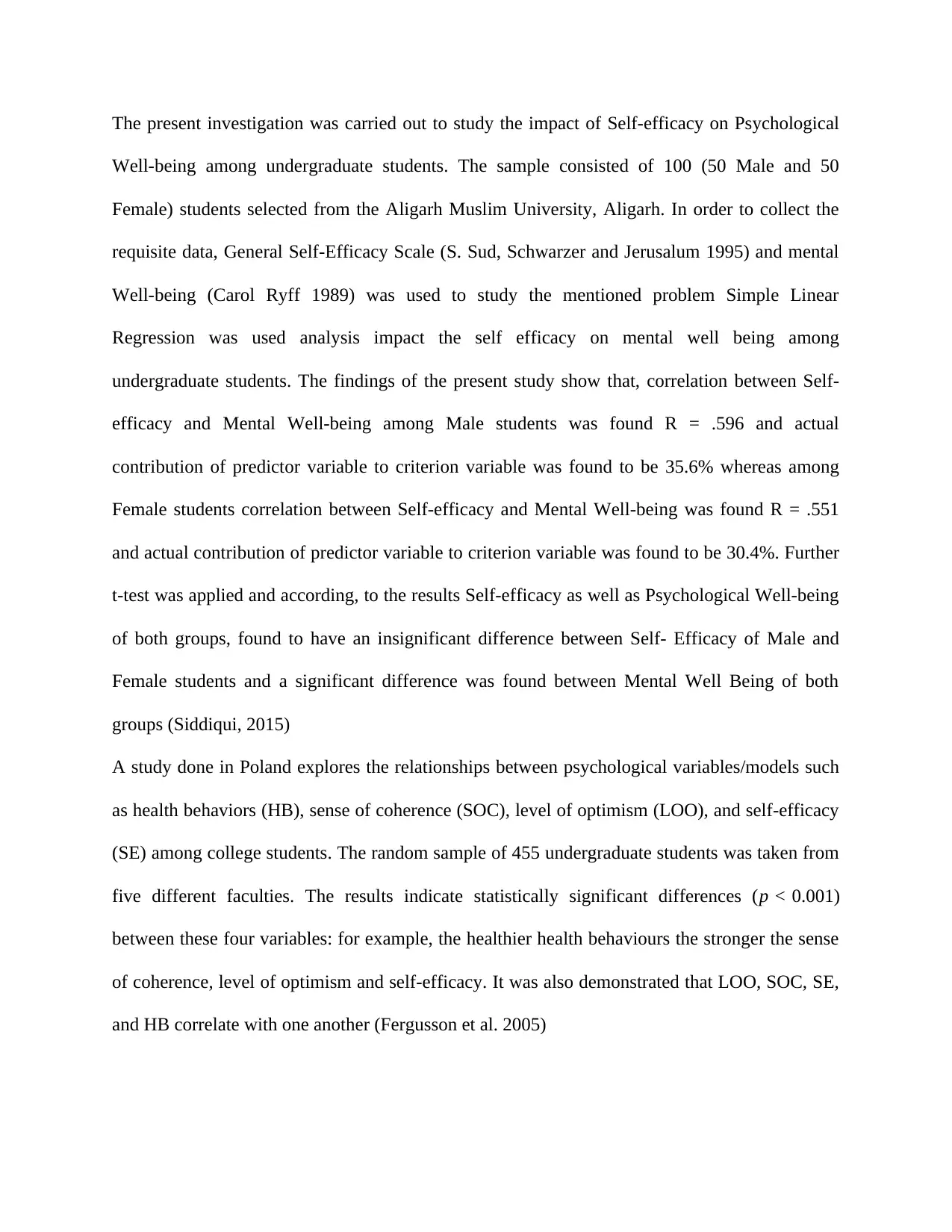
The present investigation was carried out to study the impact of Self-efficacy on Psychological
Well-being among undergraduate students. The sample consisted of 100 (50 Male and 50
Female) students selected from the Aligarh Muslim University, Aligarh. In order to collect the
requisite data, General Self-Efficacy Scale (S. Sud, Schwarzer and Jerusalum 1995) and mental
Well-being (Carol Ryff 1989) was used to study the mentioned problem Simple Linear
Regression was used analysis impact the self efficacy on mental well being among
undergraduate students. The findings of the present study show that, correlation between Self-
efficacy and Mental Well-being among Male students was found R = .596 and actual
contribution of predictor variable to criterion variable was found to be 35.6% whereas among
Female students correlation between Self-efficacy and Mental Well-being was found R = .551
and actual contribution of predictor variable to criterion variable was found to be 30.4%. Further
t-test was applied and according, to the results Self-efficacy as well as Psychological Well-being
of both groups, found to have an insignificant difference between Self- Efficacy of Male and
Female students and a significant difference was found between Mental Well Being of both
groups (Siddiqui, 2015)
A study done in Poland explores the relationships between psychological variables/models such
as health behaviors (HB), sense of coherence (SOC), level of optimism (LOO), and self-efficacy
(SE) among college students. The random sample of 455 undergraduate students was taken from
five different faculties. The results indicate statistically significant differences (p < 0.001)
between these four variables: for example, the healthier health behaviours the stronger the sense
of coherence, level of optimism and self-efficacy. It was also demonstrated that LOO, SOC, SE,
and HB correlate with one another (Fergusson et al. 2005)
Well-being among undergraduate students. The sample consisted of 100 (50 Male and 50
Female) students selected from the Aligarh Muslim University, Aligarh. In order to collect the
requisite data, General Self-Efficacy Scale (S. Sud, Schwarzer and Jerusalum 1995) and mental
Well-being (Carol Ryff 1989) was used to study the mentioned problem Simple Linear
Regression was used analysis impact the self efficacy on mental well being among
undergraduate students. The findings of the present study show that, correlation between Self-
efficacy and Mental Well-being among Male students was found R = .596 and actual
contribution of predictor variable to criterion variable was found to be 35.6% whereas among
Female students correlation between Self-efficacy and Mental Well-being was found R = .551
and actual contribution of predictor variable to criterion variable was found to be 30.4%. Further
t-test was applied and according, to the results Self-efficacy as well as Psychological Well-being
of both groups, found to have an insignificant difference between Self- Efficacy of Male and
Female students and a significant difference was found between Mental Well Being of both
groups (Siddiqui, 2015)
A study done in Poland explores the relationships between psychological variables/models such
as health behaviors (HB), sense of coherence (SOC), level of optimism (LOO), and self-efficacy
(SE) among college students. The random sample of 455 undergraduate students was taken from
five different faculties. The results indicate statistically significant differences (p < 0.001)
between these four variables: for example, the healthier health behaviours the stronger the sense
of coherence, level of optimism and self-efficacy. It was also demonstrated that LOO, SOC, SE,
and HB correlate with one another (Fergusson et al. 2005)
⊘ This is a preview!⊘
Do you want full access?
Subscribe today to unlock all pages.

Trusted by 1+ million students worldwide
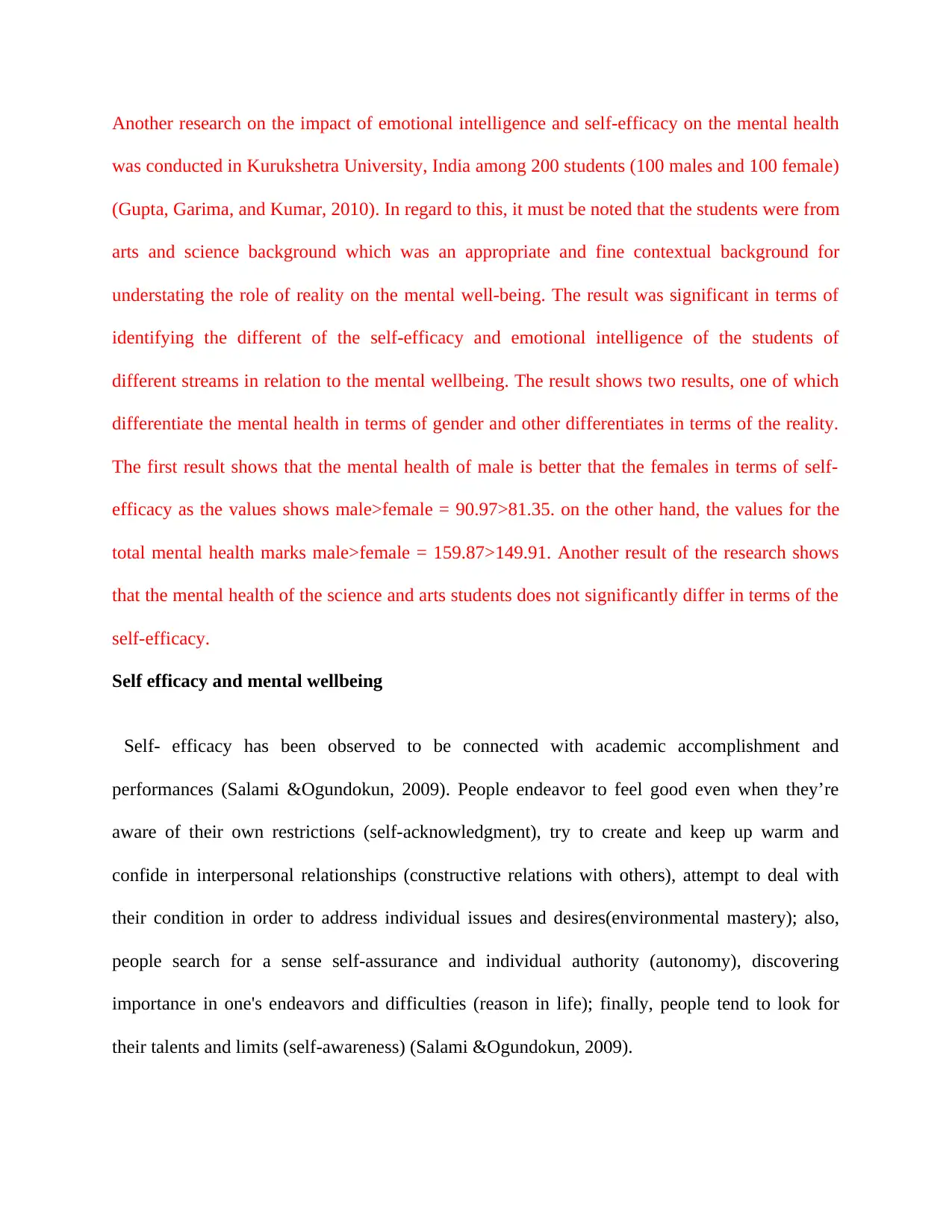
Another research on the impact of emotional intelligence and self-efficacy on the mental health
was conducted in Kurukshetra University, India among 200 students (100 males and 100 female)
(Gupta, Garima, and Kumar, 2010). In regard to this, it must be noted that the students were from
arts and science background which was an appropriate and fine contextual background for
understating the role of reality on the mental well-being. The result was significant in terms of
identifying the different of the self-efficacy and emotional intelligence of the students of
different streams in relation to the mental wellbeing. The result shows two results, one of which
differentiate the mental health in terms of gender and other differentiates in terms of the reality.
The first result shows that the mental health of male is better that the females in terms of self-
efficacy as the values shows male>female = 90.97>81.35. on the other hand, the values for the
total mental health marks male>female = 159.87>149.91. Another result of the research shows
that the mental health of the science and arts students does not significantly differ in terms of the
self-efficacy.
Self efficacy and mental wellbeing
Self- efficacy has been observed to be connected with academic accomplishment and
performances (Salami &Ogundokun, 2009). People endeavor to feel good even when they’re
aware of their own restrictions (self-acknowledgment), try to create and keep up warm and
confide in interpersonal relationships (constructive relations with others), attempt to deal with
their condition in order to address individual issues and desires(environmental mastery); also,
people search for a sense self-assurance and individual authority (autonomy), discovering
importance in one's endeavors and difficulties (reason in life); finally, people tend to look for
their talents and limits (self-awareness) (Salami &Ogundokun, 2009).
was conducted in Kurukshetra University, India among 200 students (100 males and 100 female)
(Gupta, Garima, and Kumar, 2010). In regard to this, it must be noted that the students were from
arts and science background which was an appropriate and fine contextual background for
understating the role of reality on the mental well-being. The result was significant in terms of
identifying the different of the self-efficacy and emotional intelligence of the students of
different streams in relation to the mental wellbeing. The result shows two results, one of which
differentiate the mental health in terms of gender and other differentiates in terms of the reality.
The first result shows that the mental health of male is better that the females in terms of self-
efficacy as the values shows male>female = 90.97>81.35. on the other hand, the values for the
total mental health marks male>female = 159.87>149.91. Another result of the research shows
that the mental health of the science and arts students does not significantly differ in terms of the
self-efficacy.
Self efficacy and mental wellbeing
Self- efficacy has been observed to be connected with academic accomplishment and
performances (Salami &Ogundokun, 2009). People endeavor to feel good even when they’re
aware of their own restrictions (self-acknowledgment), try to create and keep up warm and
confide in interpersonal relationships (constructive relations with others), attempt to deal with
their condition in order to address individual issues and desires(environmental mastery); also,
people search for a sense self-assurance and individual authority (autonomy), discovering
importance in one's endeavors and difficulties (reason in life); finally, people tend to look for
their talents and limits (self-awareness) (Salami &Ogundokun, 2009).
Paraphrase This Document
Need a fresh take? Get an instant paraphrase of this document with our AI Paraphraser
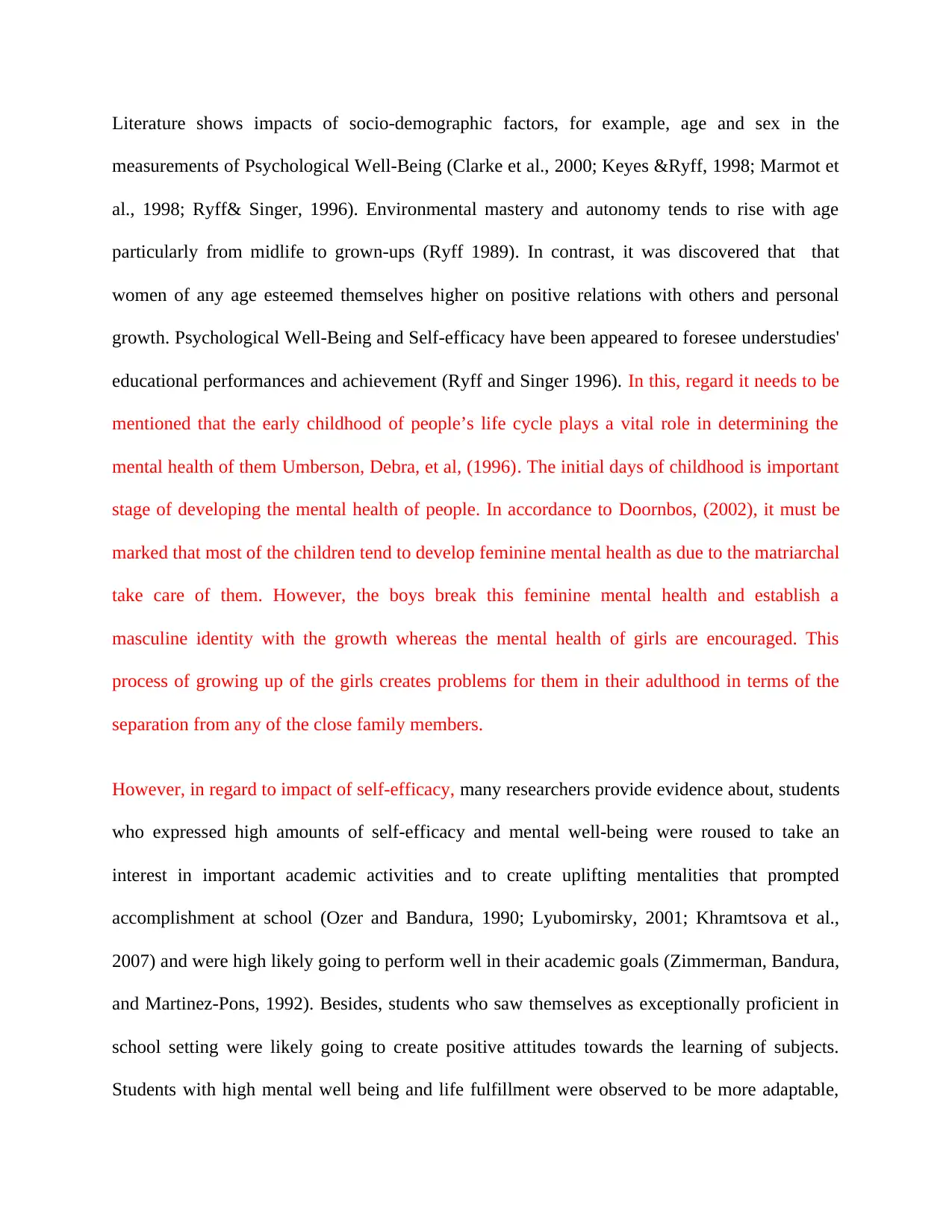
Literature shows impacts of socio-demographic factors, for example, age and sex in the
measurements of Psychological Well-Being (Clarke et al., 2000; Keyes &Ryff, 1998; Marmot et
al., 1998; Ryff& Singer, 1996). Environmental mastery and autonomy tends to rise with age
particularly from midlife to grown-ups (Ryff 1989). In contrast, it was discovered that that
women of any age esteemed themselves higher on positive relations with others and personal
growth. Psychological Well-Being and Self-efficacy have been appeared to foresee understudies'
educational performances and achievement (Ryff and Singer 1996). In this, regard it needs to be
mentioned that the early childhood of people’s life cycle plays a vital role in determining the
mental health of them Umberson, Debra, et al, (1996). The initial days of childhood is important
stage of developing the mental health of people. In accordance to Doornbos, (2002), it must be
marked that most of the children tend to develop feminine mental health as due to the matriarchal
take care of them. However, the boys break this feminine mental health and establish a
masculine identity with the growth whereas the mental health of girls are encouraged. This
process of growing up of the girls creates problems for them in their adulthood in terms of the
separation from any of the close family members.
However, in regard to impact of self-efficacy, many researchers provide evidence about, students
who expressed high amounts of self-efficacy and mental well-being were roused to take an
interest in important academic activities and to create uplifting mentalities that prompted
accomplishment at school (Ozer and Bandura, 1990; Lyubomirsky, 2001; Khramtsova et al.,
2007) and were high likely going to perform well in their academic goals (Zimmerman, Bandura,
and Martinez-Pons, 1992). Besides, students who saw themselves as exceptionally proficient in
school setting were likely going to create positive attitudes towards the learning of subjects.
Students with high mental well being and life fulfillment were observed to be more adaptable,
measurements of Psychological Well-Being (Clarke et al., 2000; Keyes &Ryff, 1998; Marmot et
al., 1998; Ryff& Singer, 1996). Environmental mastery and autonomy tends to rise with age
particularly from midlife to grown-ups (Ryff 1989). In contrast, it was discovered that that
women of any age esteemed themselves higher on positive relations with others and personal
growth. Psychological Well-Being and Self-efficacy have been appeared to foresee understudies'
educational performances and achievement (Ryff and Singer 1996). In this, regard it needs to be
mentioned that the early childhood of people’s life cycle plays a vital role in determining the
mental health of them Umberson, Debra, et al, (1996). The initial days of childhood is important
stage of developing the mental health of people. In accordance to Doornbos, (2002), it must be
marked that most of the children tend to develop feminine mental health as due to the matriarchal
take care of them. However, the boys break this feminine mental health and establish a
masculine identity with the growth whereas the mental health of girls are encouraged. This
process of growing up of the girls creates problems for them in their adulthood in terms of the
separation from any of the close family members.
However, in regard to impact of self-efficacy, many researchers provide evidence about, students
who expressed high amounts of self-efficacy and mental well-being were roused to take an
interest in important academic activities and to create uplifting mentalities that prompted
accomplishment at school (Ozer and Bandura, 1990; Lyubomirsky, 2001; Khramtsova et al.,
2007) and were high likely going to perform well in their academic goals (Zimmerman, Bandura,
and Martinez-Pons, 1992). Besides, students who saw themselves as exceptionally proficient in
school setting were likely going to create positive attitudes towards the learning of subjects.
Students with high mental well being and life fulfillment were observed to be more adaptable,
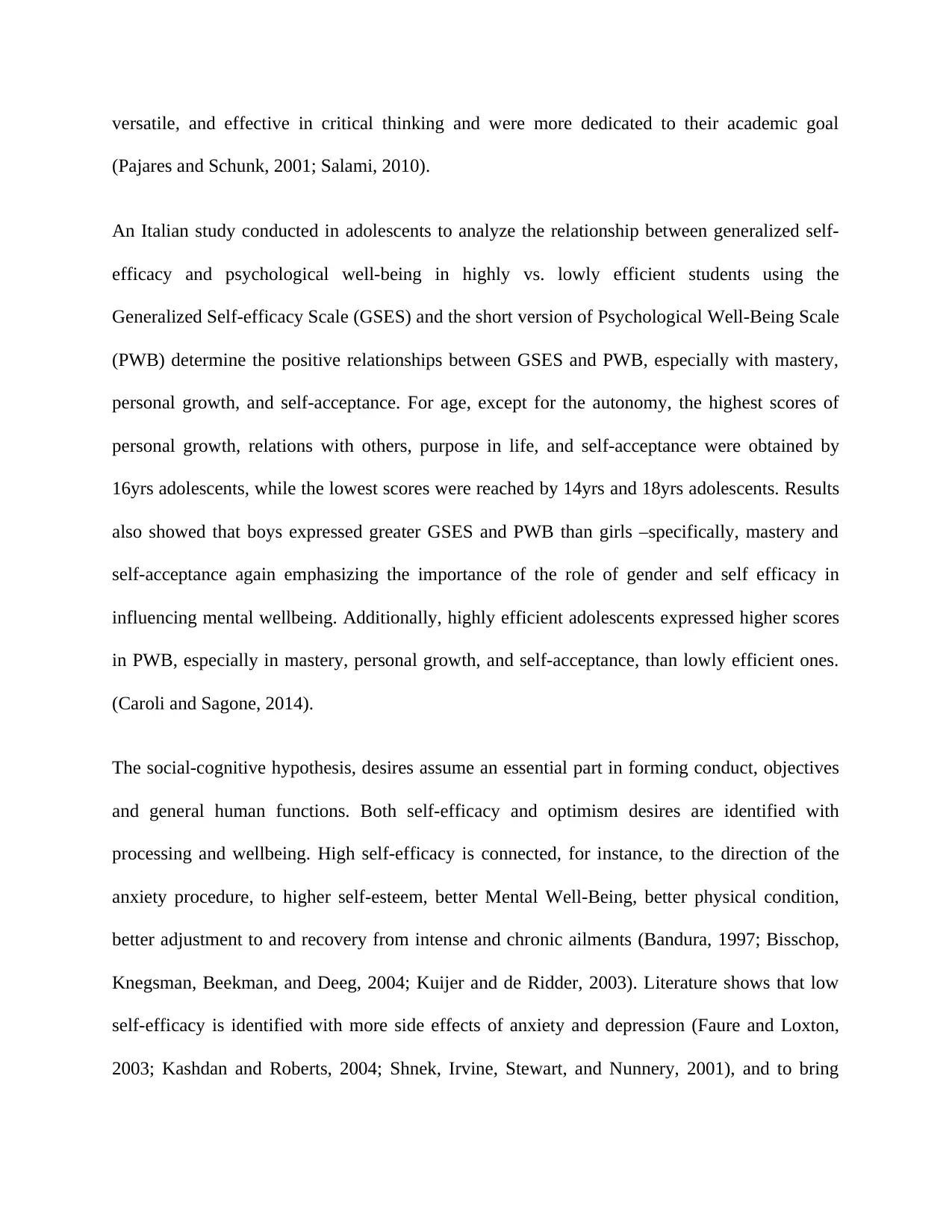
versatile, and effective in critical thinking and were more dedicated to their academic goal
(Pajares and Schunk, 2001; Salami, 2010).
An Italian study conducted in adolescents to analyze the relationship between generalized self-
efficacy and psychological well-being in highly vs. lowly efficient students using the
Generalized Self-efficacy Scale (GSES) and the short version of Psychological Well-Being Scale
(PWB) determine the positive relationships between GSES and PWB, especially with mastery,
personal growth, and self-acceptance. For age, except for the autonomy, the highest scores of
personal growth, relations with others, purpose in life, and self-acceptance were obtained by
16yrs adolescents, while the lowest scores were reached by 14yrs and 18yrs adolescents. Results
also showed that boys expressed greater GSES and PWB than girls –specifically, mastery and
self-acceptance again emphasizing the importance of the role of gender and self efficacy in
influencing mental wellbeing. Additionally, highly efficient adolescents expressed higher scores
in PWB, especially in mastery, personal growth, and self-acceptance, than lowly efficient ones.
(Caroli and Sagone, 2014).
The social-cognitive hypothesis, desires assume an essential part in forming conduct, objectives
and general human functions. Both self-efficacy and optimism desires are identified with
processing and wellbeing. High self-efficacy is connected, for instance, to the direction of the
anxiety procedure, to higher self-esteem, better Mental Well-Being, better physical condition,
better adjustment to and recovery from intense and chronic ailments (Bandura, 1997; Bisschop,
Knegsman, Beekman, and Deeg, 2004; Kuijer and de Ridder, 2003). Literature shows that low
self-efficacy is identified with more side effects of anxiety and depression (Faure and Loxton,
2003; Kashdan and Roberts, 2004; Shnek, Irvine, Stewart, and Nunnery, 2001), and to bring
(Pajares and Schunk, 2001; Salami, 2010).
An Italian study conducted in adolescents to analyze the relationship between generalized self-
efficacy and psychological well-being in highly vs. lowly efficient students using the
Generalized Self-efficacy Scale (GSES) and the short version of Psychological Well-Being Scale
(PWB) determine the positive relationships between GSES and PWB, especially with mastery,
personal growth, and self-acceptance. For age, except for the autonomy, the highest scores of
personal growth, relations with others, purpose in life, and self-acceptance were obtained by
16yrs adolescents, while the lowest scores were reached by 14yrs and 18yrs adolescents. Results
also showed that boys expressed greater GSES and PWB than girls –specifically, mastery and
self-acceptance again emphasizing the importance of the role of gender and self efficacy in
influencing mental wellbeing. Additionally, highly efficient adolescents expressed higher scores
in PWB, especially in mastery, personal growth, and self-acceptance, than lowly efficient ones.
(Caroli and Sagone, 2014).
The social-cognitive hypothesis, desires assume an essential part in forming conduct, objectives
and general human functions. Both self-efficacy and optimism desires are identified with
processing and wellbeing. High self-efficacy is connected, for instance, to the direction of the
anxiety procedure, to higher self-esteem, better Mental Well-Being, better physical condition,
better adjustment to and recovery from intense and chronic ailments (Bandura, 1997; Bisschop,
Knegsman, Beekman, and Deeg, 2004; Kuijer and de Ridder, 2003). Literature shows that low
self-efficacy is identified with more side effects of anxiety and depression (Faure and Loxton,
2003; Kashdan and Roberts, 2004; Shnek, Irvine, Stewart, and Nunnery, 2001), and to bring
⊘ This is a preview!⊘
Do you want full access?
Subscribe today to unlock all pages.

Trusted by 1+ million students worldwide
1 out of 22
Related Documents
Your All-in-One AI-Powered Toolkit for Academic Success.
+13062052269
info@desklib.com
Available 24*7 on WhatsApp / Email
![[object Object]](/_next/static/media/star-bottom.7253800d.svg)
Unlock your academic potential
Copyright © 2020–2026 A2Z Services. All Rights Reserved. Developed and managed by ZUCOL.





